Elementary Social Studies – Tools and Resources
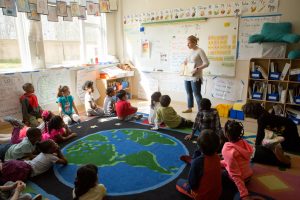
The list of demands that elementary school students, staff, and administrators are urged to meet is long and can be exhausting. Classroom educators are tasked with ensuring that our youngest Nebraskans have both the foundational knowledge and skills that will set them up for a lifetime of success. Now, possibly more than ever, it is essential that students in elementary grades receive a robust and comprehensive social studies education. Research indicates that a marginalization of social studies has occurred since 2002 (CCSSO, 2018). In a recent survey conducted by the Johns Hopkins Institute for Education Policy, of Nebraska elementary school teacher respondents, 96% report spending less than five (5) hours a week on social studies instruction. Social studies, however, is vital for the success of young learners. As a core content, social studies fosters civic and political attitudes and behaviors that promote civil discourse, an engaged citizenry, and connectedness to local communities. Studies like the one released by the Thomas B. Fordham Institute in 2020 demonstrate that “increased instructional time in social studies is associated with improved reading ability” (Tyner & Kabourek, 2020). The following are resources to support schools and educators with goals of increasing the amount of time spent implementing social studies instruction to teach and model core skills as well as provide access to high quality instructional resources.
Disclaimer: The instructional materials and resources listed below are not endorsed by the Nebraska Department of Education. The scope of responsibility to use and implement any instructional materials and resources fall within the jurisdiction of each Nebraska school district. To that end, please ensure that all teaching tools, materials, and resources have met your districts qualifications for use in the classroom or you have the approval or your school and/or district before sharing any materials with your students.
2021 Notable Social Studies Trade Books for Young People and 2022 Notable Social Studies Trade Books for Young People Preview
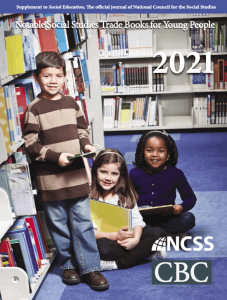 The Notable Social Studies Trade Books for Young People is an annual project of the National Council for the Social Studies (NCSS) and the CBC running since 1972. This bibliography features K-12 annotated titles published in the previous calendar year that are exceptional books for use in social studies classrooms, selected by social studies educators. The book review committee is appointed by the NCSS.
The Notable Social Studies Trade Books for Young People is an annual project of the National Council for the Social Studies (NCSS) and the CBC running since 1972. This bibliography features K-12 annotated titles published in the previous calendar year that are exceptional books for use in social studies classrooms, selected by social studies educators. The book review committee is appointed by the NCSS.
The selection committee looks for books that emphasize human relations, represent a diversity of groups and are sensitive to a broad range of cultural experiences, present an original theme or a fresh slant on a traditional topic, are easily readable and of high literary quality, and have a pleasing format and, when appropriate, illustrations that enrich the text.
Becoming Integrated Thinkers Excerpts: Case Studies in Elementary Social Studies
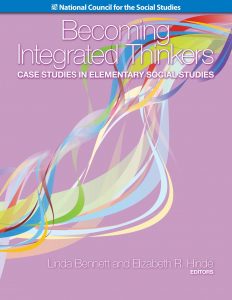
At a time when social studies, especially in elementary schools, is being curtailed and teachers are feeling pressure to teach only those subjects that are tested (often to the exclusion of social studies), we want to show that social studies is indeed alive and well in many classrooms across America. Despite the lack of attention, and perhaps even respect, that surrounds social studies, many elementary teachers are teaching the subject, and teaching it very well. This book provides descriptions of elementary teachers throughout the United States who are integrating social studies across the curriculum. Throughout the school day, students in their classrooms are learning the skills and knowledge that embody effective social studies instruction.
Integrating social studies has often been suggested as a solution to keeping the subject in the curriculum. However, as the following chapters describe, integrating social studies is not easy and requires much planning and pedagogical knowledge on the part of the teacher. The pay-off is enormous. Students in classes whose teachers have effectively integrated social studies not only keep it in the curriculum, but also demonstrate increased reading comprehension as well.
C3 Teachers – Inquiries by Grade Level
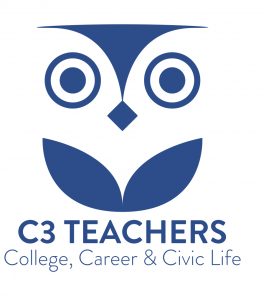 C3 Teachers aims to empower teachers as they wrestle with the big ideas and instructional implications of the C3 Framework. Teachers play a critical role in helping students learn academic content using the C3 Inquiry Arc, which outlines the social studies habits of mind, disciplinary tools and conceptual content that students need to become ready for college and career, and most importantly, civic life. As social studies students map their own disciplinary inquiries, C3 Teachers embark on a pedagogical investigation examining and experimenting with their own practice as they support students’ question, learn, apply, analyze, collaborate, express, and act in authentic social studies experiences. C3teachers.org is a place to learn more about that process and to share your experiences with other social studies teachers.
C3 Teachers aims to empower teachers as they wrestle with the big ideas and instructional implications of the C3 Framework. Teachers play a critical role in helping students learn academic content using the C3 Inquiry Arc, which outlines the social studies habits of mind, disciplinary tools and conceptual content that students need to become ready for college and career, and most importantly, civic life. As social studies students map their own disciplinary inquiries, C3 Teachers embark on a pedagogical investigation examining and experimenting with their own practice as they support students’ question, learn, apply, analyze, collaborate, express, and act in authentic social studies experiences. C3teachers.org is a place to learn more about that process and to share your experiences with other social studies teachers.
Below are inquiries found on the C3 Teachers website listed by grade level.
Kindergarten:
- Civic Ideals
- Holidays
- Identity
- Maps and Globes
- Needs and Wants
- Paper Maps
- Paper Maps and Globes
- Rules
1st Grade:
- Economic Choices
- Family
- Family Stories
- Friendship
- Global Citizen
- Map Skills
- Maps and Geography
- The President
2nd Grade:
- Civic Ideals and Practices
- Community History
- Economic Interdependence
- Geography, Humans, and Environment
- Our Relationship with Rivers
- Symbols
- Urban, Suburban, and Rural
3rd Grade:
4th Grade:
5th Grade:
- Bananas
- Betrayal
- Complex Societies
- Declaration of Independence
- New France
- Puerto Rico
- Social Media
- Sugar and Slavery
EconEdLink Classroom Resources
 EconEdLink is brought to you by the Council for Economic Education. CEE is the leading organization in the United States that focuses on the economic and financial education of students from kindergarten through high school—and we have been doing so for nearly 70 years.
EconEdLink is brought to you by the Council for Economic Education. CEE is the leading organization in the United States that focuses on the economic and financial education of students from kindergarten through high school—and we have been doing so for nearly 70 years.
The Internet-based lessons are targeted for K-12 teachers and their students. Many of the lessons include a teacher’s version as well as a student’s version. Each of the lessons are designed to be delivered in a variety of formats and classroom settings.
EDSITEment!
 EDSITEment is a partnership between the National Endowment for the Humanities and the National Trust for the Humanities.
EDSITEment is a partnership between the National Endowment for the Humanities and the National Trust for the Humanities.
EDSITEment offers free resources for teachers, students, and parents searching for high-quality K-12 humanities education materials in the subject areas of history and social studies, literature and language arts, foreign languages, arts, and culture.
All websites linked to EDSITEment have been reviewed for content, design, and educational impact in the classroom. They cover a wide range of humanities subjects, from American history to literature, world history and culture, civics, language, art, architecture, and archaeology, and have been judged by humanities specialists to be of high intellectual quality. EDSITEment is not intended to represent a complete curriculum in the humanities, nor does it prescribe any specific course of study.
The EDSITEment experience includes:
- Lesson plans composed of primary-source-rich activities suitable for elementary, middle school, high school, and Advanced Placement classrooms.
- Resources for National History Day projects, including “Ask an Expert” videos and Learning Lab collections specific to the annual theme.
- Teacher’s Guides that provide resources, project ideas, and access to NEH funded projects and programs on a variety of topics, eras, and people.
- Google Classroom compatible student activities that incorporate multi-media resources and interdisciplinary learning.
- Chronicling America, the database of historic newspapers from across the United States developed in collaboration with the Library of Congress.
- Resources for Constitution Day, heritage months, holidays, and more!
EDSITEment was selected as “Best for History” in 2019 by Scholastic Education and as one of the top 25 websites by the America Association of School Librarians in 2010. EDSITEment has been accepted into the Smithsonian Institution’s Permanent Research Collection of Information Technology, the world’s premier historical record of computing applications and innovations.
Everyday Inquiry in Elementary Social Studies
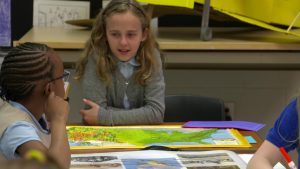 In the Everyday Inquiry in Elementary Social Studies video series you will find inspiration and direction for how elementary teachers infuse their social studies instruction with the elements of inquiry. Think it can’t be done? Check out examples from 1st, 3rd, 4th, and 5th grades that show engaged students doing the work of historians, geographers, economists, and political scientists. Watch how the teacher’s role has evolved with the shift to inquiry and hear from leaders why they support this shift.
In the Everyday Inquiry in Elementary Social Studies video series you will find inspiration and direction for how elementary teachers infuse their social studies instruction with the elements of inquiry. Think it can’t be done? Check out examples from 1st, 3rd, 4th, and 5th grades that show engaged students doing the work of historians, geographers, economists, and political scientists. Watch how the teacher’s role has evolved with the shift to inquiry and hear from leaders why they support this shift.
History’s Mysteries – Historical Inquiry for Elementary Classrooms
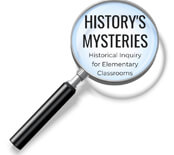 History’s Mysteries is a K-5 history curriculum that helps elementary educators re-center history in their classrooms by providing easy-to-use, adaptable, and engaging curriculum that focuses on research-based practice in historical inquiry. History’s Mysteries are inquiry-based history lessons centered around the investigation of primary sources. In each mystery, students are invited to act as history detectives as they investigate primary and secondary sources to help solve a mystery.
History’s Mysteries is a K-5 history curriculum that helps elementary educators re-center history in their classrooms by providing easy-to-use, adaptable, and engaging curriculum that focuses on research-based practice in historical inquiry. History’s Mysteries are inquiry-based history lessons centered around the investigation of primary sources. In each mystery, students are invited to act as history detectives as they investigate primary and secondary sources to help solve a mystery.
History’s Mysteries focus on important stories often not explored in elementary curriculum.
All mysteries include scaffolded primary source analysis. Rich in the use of historic images, the mysteries have multiple entry points and hone important critical and historical thinking skills without text. Elsewhere, complex text is modified for increased accessibility.
History Nebraska – Senator George W. Norris: The Life of a Public Servant
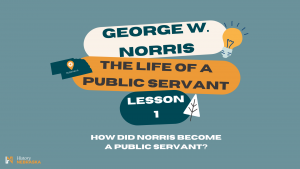 Students learn about the life and triumphs of one of Nebraska’s most important public servants George W. Norris. What does it take to be a public servant? What was life like for Nebraskans of the past? These two 30-minute lessons can be facilitated virtually by a History Nebraska Educator or teachers in their own classrooms and are recommended for 4th-grade learners.
Students learn about the life and triumphs of one of Nebraska’s most important public servants George W. Norris. What does it take to be a public servant? What was life like for Nebraskans of the past? These two 30-minute lessons can be facilitated virtually by a History Nebraska Educator or teachers in their own classrooms and are recommended for 4th-grade learners.
KidCitizen
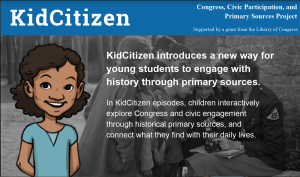 In KidCitizen’s interactive episodes, children explore civics and government concepts by investigating primary source photographs from the Library of Congress. They also connect what they find with their daily lives.
In KidCitizen’s interactive episodes, children explore civics and government concepts by investigating primary source photographs from the Library of Congress. They also connect what they find with their daily lives.
KidCitizen episodes capitalize on the active and social nature of young children’s learning. They use primary sources for rich demonstrations, interactions, and models of literacy in the course of innovative hands-on activities that make academic content meaningful, build on prior experiences, and foster visual literacy and historical inquiry. Each KidCitizen episode draws on a set of primary source photographs from the Library of Congress.
All KidCitizen episodes run on PCs, Macs, Chromebooks and iOS and Android mobile devices.
Nebraska Atlas
Teachers and students may copy any part of this atlas for classroom use or school projects. Any commercial use of the maps or text whether by copying, scanning, or photographing is expressly prohibited without written permission from the Geographic Educators of Nebraska.
Please note: The following links take you to PDF lesson plans developed for use with the Nebraska Atlas. Colorful classroom sets of the atlases were sent to schools in 2017 as a part of the Sesquicentennial celebrations and were to be kept by schools and educators for continued use. The atlas is designed to be integrated into the 4th grade Nebraska Studies curriculum in order to enhance and improve the understanding of history, geography, civics, and economics concepts. Also, the lessons reflect the 2012 state standards and not the newly adopted 2019 Nebraska Social Studies Standards.
Nebraska Farm Bureau Foundation
 Nebraska Agriculture in the Classroom (AITC) is a statewide program that helps K-12 students and teachers develop an awareness and understanding that agriculture is their source of life’s necessities. AITC has a long history of creating resources tied to state education standards to assist teachers in connecting their students to their source of food, fiber, and fuel – agriculture!
Nebraska Agriculture in the Classroom (AITC) is a statewide program that helps K-12 students and teachers develop an awareness and understanding that agriculture is their source of life’s necessities. AITC has a long history of creating resources tied to state education standards to assist teachers in connecting their students to their source of food, fiber, and fuel – agriculture!
Agriculture in the Classroom ® is a program coordinated by the United States Department of Agriculture (USDA). In Nebraska, the Agriculture in the Classroom program is managed by the Nebraska Farm Bureau Foundation, whose mission is to engage youth, educators, and the general public to promote an understanding of the vital importance of agriculture in the lives of all Nebraskans.
Nebraska Agriculture in the Classroom
- Offers materials to encourage active learning with hands-on activities for youth.
- Creates instructional materials aligned to Nebraska State Standards.
- Equips teachers with free programs and resources to bring agriculture alive in the classroom.
Open Social Studies

Starting in the early elementary grades, all children should receive regular instruction in the social studies, which includes history, civics, geography, and economics. However, there are real pressures on schools and teachers to increase the amount of instruction in other subject areas, which often comes at the expense of their social studies time.
This curriculum was built to help teachers in K-6 schools regularly enact powerful and authentic social studies in their classrooms that will also meet essential literacy goals (linking every lesson to the Common Core State Standards). In other words, it leverages the richness of social studies content to help students learn to read, write, and think critically while exploring the past and present world around them. Moreover, it aims to make every single lesson culturally relevant, connecting to the racial, ethnic, gender, class, language, and immigration experience of the increasingly diverse United States.
PBS Learning Media – Elementary Social Studies
 Discover exciting resources and methods for teaching social studies to students from pre-kindergarten through fifth grade in Elementary Social Studies. Students can practice making inferences as they explore animal shelters, research using the Great States series, or complete a graphic organizer to compare holidays with the All About the Holidays series. Topics ranging from the leadership of Abraham Lincoln to Neil Armstrong’s first mission to the moon are covered in Elementary Social Studies.
Discover exciting resources and methods for teaching social studies to students from pre-kindergarten through fifth grade in Elementary Social Studies. Students can practice making inferences as they explore animal shelters, research using the Great States series, or complete a graphic organizer to compare holidays with the All About the Holidays series. Topics ranging from the leadership of Abraham Lincoln to Neil Armstrong’s first mission to the moon are covered in Elementary Social Studies.
Smithsonian Learning Lab
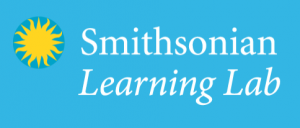 The Smithsonian Learning Lab is about discovery, creation, and sharing.
The Smithsonian Learning Lab is about discovery, creation, and sharing.
The Smithsonian Office of Educational Technology (OET) created the Smithsonian Learning Lab to inspire the discovery and creative use of its rich digital materials—millions of images, recordings, and texts. It is easy to find something of interest because search results display pictures rather than lists. Whether you’ve found what you were looking for or just discovered something new, it’s easy to personalize it. Add your own notes and tags, incorporate discussion questions, and save and share. The Learning Lab makes it simple.
By encouraging users to create and share personalized collections of Smithsonian assets and user-generated resources, the Learning Lab aspires to build a global community of learners who are passionate about adding to and bringing to light new knowledge, ideas, and insight.
The Learning Lab infuses real-world experiences into learning to build lasting knowledge and critical skills that take learners from simply finding resources to thoughtful selection, organization, and creation of new resources.
Why Use It?
Guided by our desire to create authentic, meaningful, and personalized learning experiences, the Learning Lab blends trusted resources and contemporary media for learners of all ages to:
- make discoveries across disciplines
- create new ideas
- share their knowledge and creations with a global community of experts and peers
- access vast collections in history, science, art, and culture
- build lasting educational networks
At the Smithsonian, a new object is digitized every six seconds, ensuring the Learning Lab has something fresh to offer visitors each time they return.
The tools and resources offered within the platform simplify workflow, allowing users to create and share collections while sparking new ideas.
Educators are encouraged to share within communities of practice so peers may provide feedback, reuse, or adapt Smithsonian or personally created resources to meet their own needs.
Teacher Author eBooks Library – Making Invisible Histories Visible Project
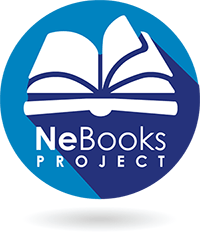 During the summer of 2013, eight Omaha Public Schools teachers each developed an iBook on a topic of Omaha and Nebraska history as it relates to African American History. The four 3rd grade books are: Then and Now: A Look at People in Your Neighborhood; Our City, Our Culture; Civil Rights: Standing Up for What’s Right to Make a Difference; and The Great Migration: Wherever People Move, Home is Where the Heart is. The four 4th grade books are Legends of the Name: Buffalo Soldiers in Nebraska; African American Pioneers; Notable Nebraskans; and WWII: Double Victory.
During the summer of 2013, eight Omaha Public Schools teachers each developed an iBook on a topic of Omaha and Nebraska history as it relates to African American History. The four 3rd grade books are: Then and Now: A Look at People in Your Neighborhood; Our City, Our Culture; Civil Rights: Standing Up for What’s Right to Make a Difference; and The Great Migration: Wherever People Move, Home is Where the Heart is. The four 4th grade books are Legends of the Name: Buffalo Soldiers in Nebraska; African American Pioneers; Notable Nebraskans; and WWII: Double Victory.
Each book was written by a local Omaha author, and illustrations were created by a local artist. Photographs, documents, and other artifacts included in the book were provided by local community members and through partnership with the Great Plains Black History Museum.
These books provide supplemental information on the role of African Americans in Omaha and Nebraska history topics. It is important to integrate this material in order to expand students’ cultural understanding, and highlight all the historical figures that have built this state. Each book allows students to go beyond the content through analysis activities using photos, documents, and other artifacts.Through these iBooks, students will experience history and its connections to their own cultures and backgrounds.
Unicam Kids
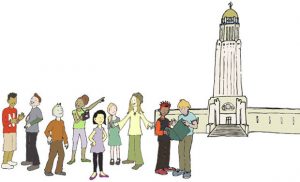 Unicam Kids is a civic education resource produced by the Clerk of the Nebraska Legislature ‘s Unicameral Information Office.
Unicam Kids is a civic education resource produced by the Clerk of the Nebraska Legislature ‘s Unicameral Information Office.
For free copies of the corresponding Unicam Kids! guide, contact the Unicameral Information Office at (402) 471-2788 or uio@leg.ne.gov.



